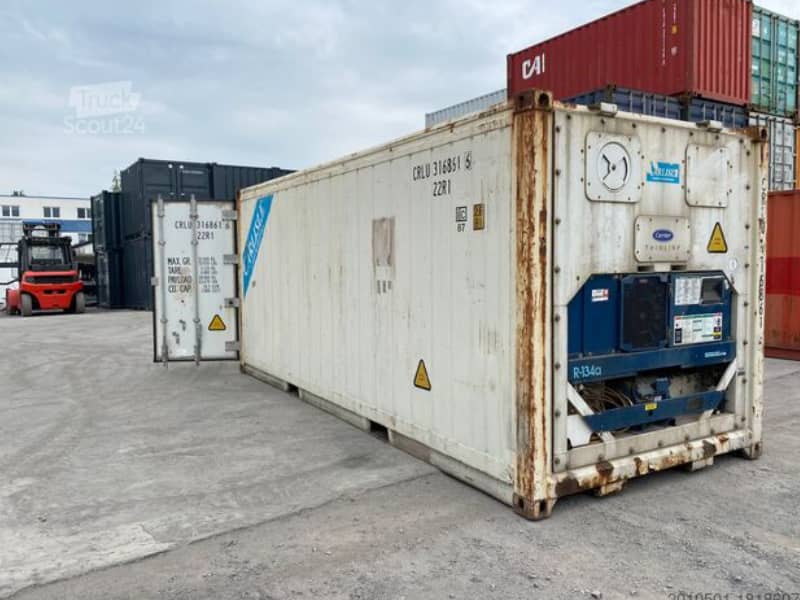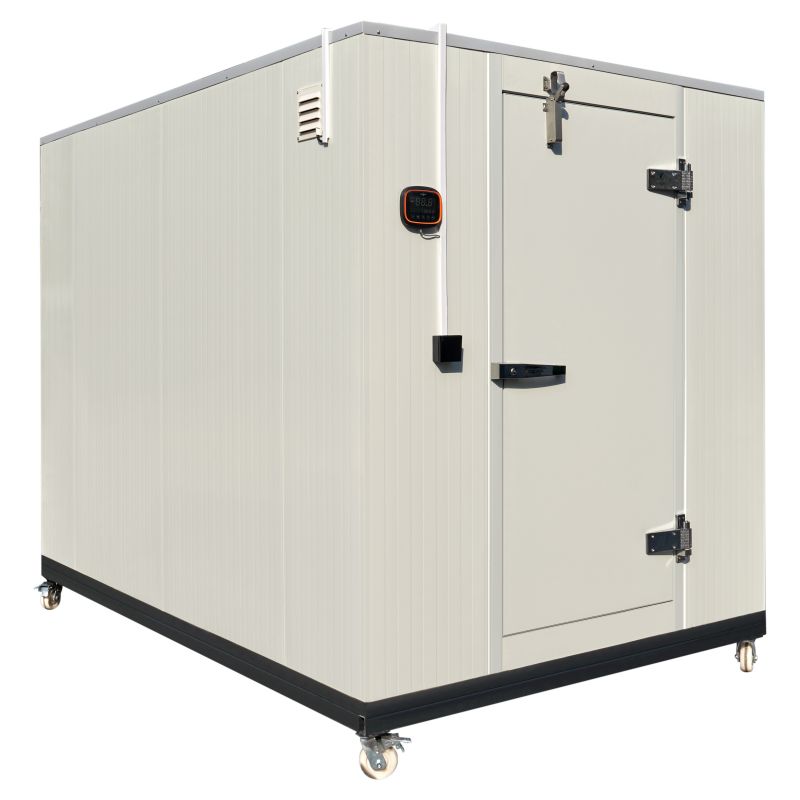Everything About Cold Store Containers: Necessary Insights for Your Storage Requirements
Cold store containers play an important duty in the conservation of perishable goods. They can be found in different kinds, including cooled and protected units, each designed for certain storage needs. Comprehending the benefits and crucial features of these containers is essential for organizations aiming to enhance their procedures. As the demand for reliable storage remedies grows, exploring the various choices offered can result in notified choices that affect both profitability and sustainability. What aspects should one think about when picking the best container?
Kinds of Cold Storage Containers
Cold storage containers been available in different types, each developed to satisfy specific temperature level control requirements. Among one of the most typical types are cooled containers, which keep temperatures in between 0 ° C to 10 ° C, making them appropriate for subject to spoiling goods like fruits, vegetables, and dairy items. Another type is the deep freezer container, which operates at temperatures below -18 ° C, suitable for lasting storage space of frozen things such as meats and fish and shellfish.
Insulated containers give temperature level stability without active cooling, making them helpful for temporary transport of temperature-sensitive items. In addition, there are mobile cool storage devices, which provide flexibility in locations and are typically made use of in occasions or seasonal procedures. Lastly, blast chillers swiftly reduce the temperature of hot foods, ensuring safety and high quality. Each kind serves a special objective in various sectors, from food solution to pharmaceuticals, stressing the importance of selecting the appropriate container for certain storage needs.

Advantages of Utilizing Freezer Solutions

Moreover, freezer solutions expand the life span of items, reducing waste and boosting success for services. By efficiently handling supply with proper temperature level control, firms can maximize their supply chains and boost functional efficiency.
Furthermore, chilly storage centers permit for versatile storage options, accommodating different quantity needs and seasonal changes sought after (used 40ft refrigerated shipping containers). This adaptability helps organizations respond rapidly to market modifications
Finally, using cold store services can guarantee compliance with health and safety and security laws, safeguarding both consumers and organizations. Generally, the tactical use cool storage space improves product monitoring while promoting sustainability and financial stability.
Secret Attributes to Search For in Cold Store Containers
When choosing cold store containers, several essential attributes quality mindful consideration to protect peak efficiency and reliability. Initially, temperature control capacities are necessary; containers must preserve regular temperature levels appropriate for particular products. Insulation top quality additionally plays a considerable function, as exceptional insulation minimizes power intake and enhances temperature level security.
Next off, ease of accessibility and loading is essential; containers should use easy to use layouts for efficient handling and organization. Sturdiness is one more vital facet; weather-resistant products ensure durability and protect materials against ecological elements.
In addition, flexibility attributes, such as integrated wheels or raising factors, facilitate transportation, while customizable layouts permit for customized storage space options.
Keeping an eye on systems, including temperature alarms and remote monitoring, give real-time updates, making specific that problems continue to be optimal. By concentrating on these features, users can select freezer containers that meet their operational demands successfully.
Selecting the Right Cold Storage Container for Your Requirements
Choosing the appropriate freezer container requires a thoughtful analysis of operational requirements and specific demands. Variables such as the kind of products being saved, temperature level level of sensitivity, and quantity needs to be focused on. Disposable food things might necessitate containers with stringent temperature level controls, while drugs may require accurate problems to keep efficiency.
Additionally, possible customers need to think about the container's size and mobility. A larger unit might be necessary for mass storage space, while smaller, mobile alternatives can be optimal for on-site or short-term requirements. Insulation top quality and energy efficiency are additionally crucial, as these will impact functional expenses and temperature level stability.
Conformity with sector regulations and standards is crucial, specifically in industries like food and health care. By meticulously reviewing these elements, individuals can select a cool storage space container that efficiently fulfills their distinct needs and warranties optimum storage conditions.
Best Practices for Maintaining Freezer Issues
Keeping suitable cool storage conditions is necessary for preserving the high quality and safety and security of temperature-sensitive products. Frequently keeping an eye on temperature and moisture degrees is critical; using reputable digital thermostats and hygrometers can provide accurate analyses. Furthermore, appropriate insulation of freezer containers assists reduce temperature changes and energy loss.
Executing a first-in, first-out (FIFO) system ensures that older stock is used before more recent supply, minimizing waste (used 40ft refrigerated shipping containers). Additionally, maintaining an arranged format within the storage room permits better airflow and reduces the risk of cross-contamination
Routine upkeep checks on devices, such as compressors and seals, are very important to stop malfunctions. Team training on best practices for packing and discharging items aids preserve temperature level integrity. Finally, keeping doors shut as high as feasible limitations warm exchange, ensuring that the cold store setting stays efficient and steady in protecting beneficial products.
Expense Considerations for Freezer Solutions
When examining freezer options, it is vital to consider the initial financial investment costs together with continuous functional costs. An extensive failure of these prices can disclose significant long-lasting cost savings potential for services. Understanding these financial elements aids stakeholders make educated choices regarding their freezer demands.

Initial Financial Investment Prices
The economic landscape of click resources freezer containers presents various preliminary financial investment expenses that businesses should take into consideration. These costs typically include the acquisition or rental cost of the containers, which can differ based upon insulation, size, and kind top quality. Furthermore, expenditures connected to retrofitting existing frameworks to suit cold store has to be factored in, especially if specialized tools is needed. Setup costs, visit this site consisting of electrical work and refrigeration systems, likewise add to the overall first financial investment. Services should not neglect transportation costs for supplying containers to their wanted area. Prospective personalization alternatives, such as shelving or temperature level monitoring systems, can additionally affect the preliminary financial expense. Cautious budgeting for these elements is crucial for successful chilly storage implementation.
Operational Expenses Failure
Functional expenses for chilly storage options incorporate several important expense considerations that companies need to navigate. Trick elements consist of energy prices, which can be considerable due to the requirement to preserve low temperature levels. Maintenance expenditures are also significant, as normal servicing is vital to assure tools runs successfully and stays compliant with health and wellness requirements. In addition, labor prices may develop from the need for specialized team to keep track of the storage and handle setting. Insurance costs are one more factor to consider, as business must protect their financial investments versus prospective losses. Lastly, any type of prospective regulative conformity costs should be factored in, as services may require to invest in systems that stick to food safety and security and environmental policies. Comprehending these expenditures is important for efficient budgeting.
Long-Term Savings Potential
Spending in cold store solutions provides substantial long-lasting financial savings possibility, transforming preliminary expenses right into economic performance over time. By minimizing perishing and waste, companies can improve their earnings margins significantly. Advanced insulation and energy-efficient systems minimize utility expenses, which accumulate over the lifespan of the devices. Cold storage space containers typically call for much less constant maintenance compared to conventional refrigeration techniques, leading to lower fixing expenses. The capacity to store items for extended periods without jeopardizing high quality permits companies to profit from market changes, maximizing profits. Furthermore, the scalability of freezer services makes it possible for business to adjust to transforming demands without sustaining too much costs. Overall, these variables contribute to an engaging case for cold store as a cost-effective financial over here investment method.
Regularly Asked Questions
The Length Of Time Can Food Be Stored in Cold Store Containers?
The period food can be stored in cold store containers varies by kind. Typically, subject to spoiling items last from days to weeks, while icy foods can continue to be secure for months, depending upon appropriate temperature level and storage conditions.
Are Freezer Containers Energy-saving?
The power performance of cold storage containers varies based on style and insulation top quality. Modern units frequently utilize innovative technology to decrease power usage, ultimately adding to lowered operational prices and environmental impact in lasting use.
Can Cold Storage Containers Be Custom-made for Details Demands?
Cold store containers can indeed be tailored to meet certain needs. Modifications may include temperature controls, size modifications, and added attributes, allowing customers to customize solutions successfully for various storage requirements and operational choices.
What Are the Usual Sizes of Freezer Containers?
Cold storage space containers typically can be found in standard sizes such as 10, 20, and 40 feet. These dimensions suit different storage requirements, making sure versatility for companies needing temperature-controlled environments for sensitive products or subject to spoiling items.
Do Freezer Containers Require Special Permits for Usage?
Cold store containers often require unique licenses for usage, relying on neighborhood regulations and intended applications. Authorities might mandate authorizations to guarantee safety standards, environmental conformity, and correct operational techniques are preserved throughout their use.
Cold storage containers come in numerous types, each developed to satisfy certain temperature level control requirements. Additionally, chilly storage space facilities permit for flexible storage options, fitting various quantity demands and seasonal fluctuations in need. Choosing the appropriate cold storage space container calls for a thoughtful analysis of functional needs and specific requirements. The economic landscape of chilly storage containers provides different preliminary investment expenses that organizations should think about. Cold storage space containers can without a doubt be personalized to satisfy certain requirements.